Johnny Depp Lookalike In Iran’s Religious Ceremonies Goes Viral

Video and photos of an Iranian man who looks like Hollywood star Johnny Depp during an Islamic mourning ceremony in Tehran have gone viral in Iranian media.

Video and photos of an Iranian man who looks like Hollywood star Johnny Depp during an Islamic mourning ceremony in Tehran have gone viral in Iranian media.
The Depp lookalike is reportedly identified as Amin Sa'les, who apparently does some modelling gigs thanks to his uncanny resemblance to the American actor.
Sa'les lives in Iran and is reportedly from the north-western city of Tabriz. His modelling work is with local agencies.


Huge gatherings have been held in Iran and some other Muslim countries in the past 10 days, the first days of the first month of the Islamic calendar, to commemorate the third Shiite Imam Hussain.
Such ceremonies are vastly popular among Iranians as they are complemented by copious supplies of free food and drinks, known as nazri. They are given free by individuals and groups at kiosks called heyats set up all over the country.
The highlight of the month-long ceremonies of Muharram are the Days of Tasu'a and Ashura, the anniversary of the slaying of Shiite Imam Hussein and his 72 companions by his rivals to the leadership of Muslims in the 7th century.
Ceremonies have been held for centuries in Iran and among Shiites in other countries, marking the event in the 680 AD battle of Karbala, in present-day Iraq, and have gained greater state support since the 1979 Islamic Revolution.
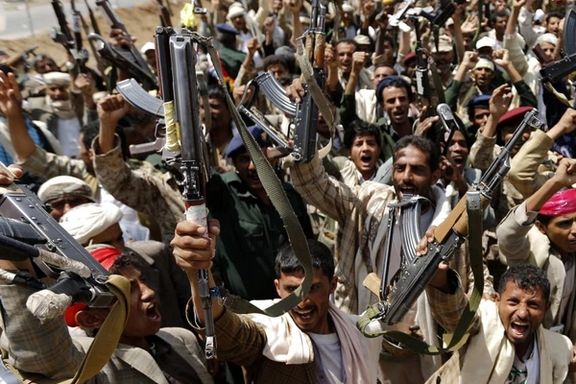
At least six Iranian and Lebanese advisers were killed in Yemen on Monday by a ballistic missile that exploded while being redeployed at a camp run by the Iran-backed Houthis.
According to reports by Saudi broadcaster Al Arabiya and other Arabic-language news outlets, dozens of Houthi militants were also killed as the blast triggered a second explosion in a nearby factory and weapons depot near Yemen’s capital Sa’ana.
Yemeni websites also quoted a military source as saying that these explosions were caused by the unsuccessful launch of a missile from the Al-Hafa military base by Houthi militias.
Later in the day, Yemen’s internationally recognized government accused the Iran-backed Houthis of not abiding by a key element in a UN-brokered truce to reopen roads to the besieged city of Taiz, saying the group was “running away” from its commitments.
Foreign Minister Ahmed Awad bin Mubarak also said in a news conference in Amman that his Aden-based government supports any move to expand the truce beyond the latest two-month extension to a durable peace deal.
The Houthis receives military and political support from Iran in their conflict with other Yemenis backed who are backed by a Saudi-led coalition since 2014. Iran has been sharing its missile and drone technology with Yemen’s Houthis and has also supplied other proxy forces, such as the Lebanese Hezbollah and Iraqi Shiite militias.
The United States, its Western allies and others blame Iran’s drones and missiles for attacks by Houthis on Saudi and Emirati energy facilities.
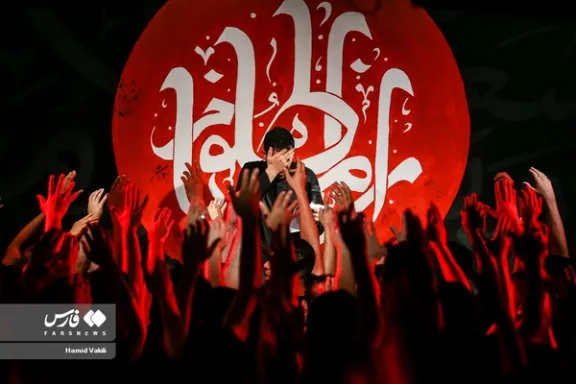
Amid a resurgence of covid-19 pandemic and the growing fatalities in Iran, mourning ceremonies of the Islamic month of Muharram were held with no restrictions, except for the Supreme Leader.
While the Shiite mourning ceremonies were held privately for Ali Khamenei, similar to the past two years in fear of the spread of the coronavirus, authorities did not announce any measures for the large gatherings across the country.
The highlight of the month-long ceremonies of Muharram are the Days of Tasu'a and Ashura, the anniversary of the slaying of Shiite Imam Hussein and his 72 companions. Ceremonies have been held for centuries in Iran and among Shiites in other countries, marking the event in the 680 AD battle of Karbala, in present-day Iraq, and have gained greater state support since the 1979 Islamic Revolution.
The number of infections and deaths caused by the virus has doubled in the last two weeks, and it is expected that this upward trend will continue in the coming days. The Health Ministry said the number of new patients on Sunday, August 9, was at around 5,500 and the death toll at 63.
In July, the government organized a “10-kilometer-long” ceremony to celebrate a religious holiday in Tehran as health authorities had announced the seventh wave of the pandemic.
According to epidemiologists, two new subvariant of Omicron, namely BA4 and BA5 -- which started in the African continent -- may soon prevail over the country.
The number of overall deaths in Iran since Covid-19 emerged in February 2020 has been 300,000 higher than in previous years, suggesting pandemic deaths may be more than officially reported.
Iran has reported nearly 143,000 deaths from Covid, the Middle East’s highest official level, leaving 160,000 more deaths unexplained.
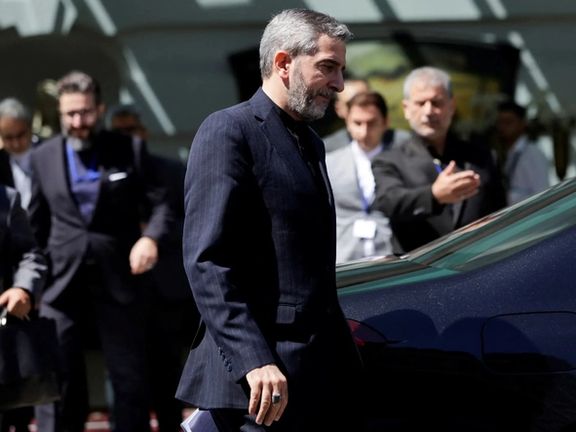
An Iranian foreign ministry official has rejected reports that the text of an agreement to salvage the 2015 nuclear deal could be finalized in the coming hours.
The Iranian government’s official news website IRNA quoted the unnamed official as saying that the talks are still underway on some important issues and that “we are not yet at a stage where we can talk about a finalized deal.”
“Given the continuation of discussions on some remaining important issues, we’re not yet at a stage to finalize the text. Iran has presented its constructive views to the other party so as to move forward and the result is up to their political decision,” the source said. “We believe that Vienna Talks can be concluded soon provided that the other party makes an appropriate decision. But we are not at that stage yet.”
He made the remarks in reaction to a Sunday report by The Wall Street Journal that cited the European Union's coordinator Enrique Mora as saying the negotiations to restore the JCPOA (the Joint Comprehensive Plan of Action) are close to completion but it remained unclear whether Tehran will accept the final deal. The text of a deal could be closed in the coming hours, Mora had said.
However, Iran must still decide whether to set aside its demand that the nuclear deal can only be revived if a multiyear United Nations’ atomic agency safeguard probe into its nuclear program is closed, the report added, noting that “Several Western diplomats said Sunday that Tehran has doubled down on this condition in the past few days of talks and there is no agreement on the issue.”
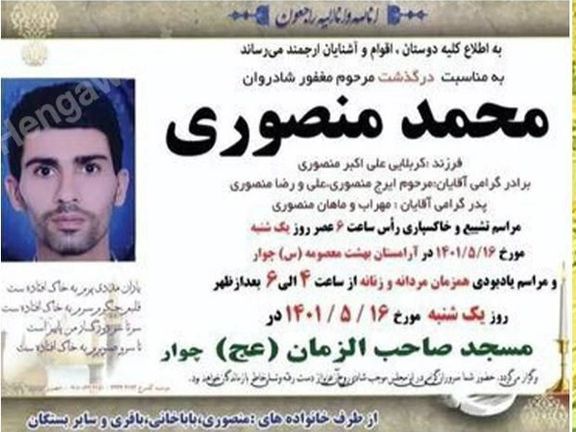
Amid a dire economic situation in Iran that has been worsening in recent months, another worker committed suicide due to dismissal from his workplace.
Hengaw Organization for Human Rights reported on Monday that Mohammad Mansouri, a 32-year-old father of two, hanged himself in his home in the western province of Ilam on Sunday, August 7.
The report said that "livelihood problems" were the reason behind his death and that he had been working at Chovar petrochemical company for several years before he was fired a few months ago.
Workers of petroleum and petrochemical companies are especially vulnerable due to their hard working conditions and low wages.
A union for contract workers of the oil sector announced on Saturday that 35 workers of Abadan refinery in southern Iran passed out due to the heat, and were taken to hospital. Despite the temperature rising to more than 50 degrees Celsius – about 122 in Fahrenheit scale – in the southern parts of the country, where most of the oil and gas plants are located, subcontractors for the government refuse to stop work even for a few hours.
The incidents occurred less than a week after an Iranian war veteran injured during the eight-year conflict with Iraq died after setting himself on fire due to financial hardship in the Kurdish-majority city of Sonqor in Western Iran. According to reports, it was the ninth case of self-immolation due to livelihood problems and vocational issues in the past 70 days.

An IRGC-linked news agency has slammed a former diplomat for suggesting that Iran should balance its foreign policy by having relations with both the US and Russia.
Nasser Nobari, a former Iranian diplomat, told President Ebrahim Raisi in an open letter that Iran’s politico-economic interests would be best secured if the country adopted a foreign policy of “positive equilibrium and independent multilateralism” like India, that is, to maintain good relations with both The United States and Russia.
In a commentary entitled ‘Balanced Foreign Policy or Positive Balance Policy’ Saturday, Fars news agency slammed Nobari for suggesting the adoption of ‘positive equilibrium’ as the most suitable approach in Iran's foreign policy rather than the so-called ‘balanced foreign policy’ adopted by the government which excludes any relations with the US and focuses on relations with neighboring countries and the ‘East’.
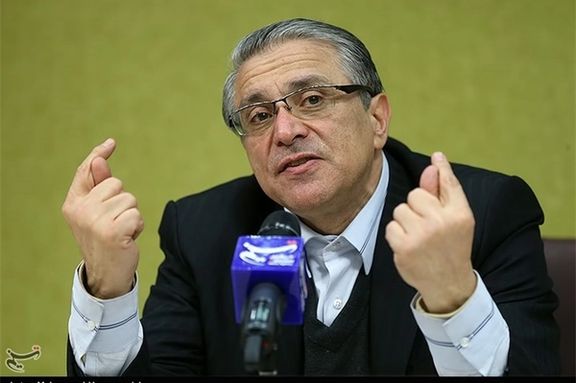
“Does the said person believe … that the US is changing its Middle Eastern policy and wants to entice Iran [to have diplomatic relations] by increasing rapport with Iran and reliance on complex diplomacy towards the Zionist regime, Arab countries, and Iran?” the commentary asked.
It went on to stress that “the relationship between the World Arrogance (Western powers) led by the United States with the Islamic Republic is a zero- sum game … and will definitely not change”.
The Fars commentary went on to argue that relations with the United States would only be possible if its political system “collapses and gives way to an anti-imperialist or at least a non-Imperialist system”.
The policy of relying on Asia or the East, particularly China and Russia, was promulgated by Supreme Leader Ali Khamenei in 2018, with the catchphrase, “Looking East”.
"We should look East, not West. Pinning our hope on the West or Europe would belittle us as we will have to beg them for favors and they will do nothing," Khamenei said in a speech in October 2018.
In his letter, Nobari who served as Iran’s ambassador to the Soviet in 1980s said the recent visit of Russian President Vladimir Putin to Iran, and the US envoy Robert Malley’s suggestion to Iran not to “opt for a position of relative dependency on Russia” indicate that both superpowers are eager to entice the Islamic Republic to choose them over the other.
“It is the first time in the past three centuries that Iran has and can make a choice and it's the superpowers that are competing with each other to bring Iran to their fold rather than dictating or imposing their decisions on Iran as they did in the Tehran Conference [during the 2nd World War],” he wrote.
The former diplomat also warned that not using this opportunity could constrain Iran’s influence in the international community and backfire as a threat.
A similar view was expressed recently by former senior conservative lawmaker, Ali Motahari, who said ‘Looking East’ should not be tantamount to distancing Iran from the West. “We need to maintain relations with both sides and take advantage of the rivalry between them. However, cutting all ties with the West would not serve the nation's interests," he said in an interview with Khabar Online.
The conservative Jomhouri Eslami newspaper on August 4 criticized the foreign ministry spokesman Nasser Kanaani for being overjoyed by the recent quarrels between Beijing and Washington over Nancy Pelosi’s visit to Taiwan and taking sides with China.
“How does a neutral policy harm us in such disputes?”, an editorial in the newspaper asked. “Doesn't Neither East nor West mean not to take sides in the disputes between two domineering powers?”
‘Neither East nor West’ was the foreign policy approach promulgated by the founder of the Islamic Republic Ayatollah Ruhollah Khomeini and was Iran's official foreign policy motto until ‘Looking East’ took its place.